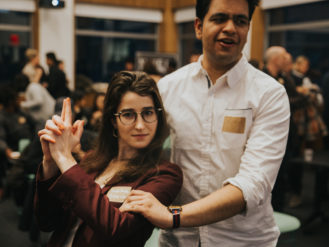How Cryptocurrency Could Change Filmmaking
A Brooklyn-based director aims to finance her thriller, 'Braid,' using an emerging technology for fundraising
A scene from a teaser video for the film, which is scheduled to start filming late this month (Image courtesy of the filmmakers)
When Brooklyn-based filmmaker Mitzi Peirone went looking for investors to make her indie psycho-thriller, Braid, she had to think outside the frame. The usual sources of funding were problematic for her $1.7 million film: either too big and controlling (the major studios) or too small to handle her budget (Kickstarter and Indiegogo). But her chance meeting with a tech pioneer inspired her to try a new formula that could change the film business: crowdfunding with a cryptocurrency akin to bitcoin.
In 2015, Peirone was a novice filmmaker with a script in search of funding. At an Upstate New York music festival, she met Joseph Lubin, a tech entrepreneur in search of applications for the emerging technology called blockchain. As often happens in the innovation world, a problem (in this case, financing independent films) had encountered a potential solution. Two years later, the result is a heady brew of culture and science: a reality-distorting thriller to be funded via a technology, Ethereum, named after the clear blue sky.
Here’s how the deal works. When Braid’s online campaign starts Wednesday, would-be movie moguls will be able to buy digital tokens that represent their investment in the film. (The sale will be made only to investors outside the U.S., since security regulations here would add prohibitive registration fees to an offering of this size, the partners say.) Braid’s revenues will be paid out to token holders until they recoup their investment, plus 15% interest, and 30% of any profits.
The sale enables the movie partners to “fuse the ingenuity of crowdfunding with the financial benefit of a small type of investment,” said Ryan Gittleson, the film’s marketing director and a project manager for ConsenSys, the Brooklyn-based tech firm started by Lubin that’s partnering with the filmmakers. Braid would be the first feature film fully financed this way, its makers say, potentially opening up film production to a wider world of emerging talents and prospective investors. (Update: Braid reached its funding goal of $1.7 million and starting filming in late June.)
Her Dark Materials
The wonky optimism of the movie’s funding method contrasts with Peirone’s dark movie plot, influenced by a bleak chapter in her life. Peirone is a native of Turin, Italy, where her life had been filled with art, classical music, philosophy. The painter and model moved to New York City at 19 and enrolled in theater school. At 22, she was cast in a film that she was also co-writing. But show business quickly turned ugly. “The director hit on me,” said Peirone, “and then fired me.”

Braid‘s writer and director, Mitzi Peirone (Photo by David Aronson)
Peirone was an unemployed immigrant with visa problems. “It was the darkest time of my life and it was also the most important time in my life,” she said, because it triggered a moment of reflection about why things work out the way they do–or don’t–and inspired her to write the script for Braid. “We don’t see things as they are,” she said, “we see things as we want them to be.”
In Braid, two self-proclaimed artists get entangled in drug dealing and wind up owing a hefty sum to a crime boss. To pay the money back, they decide to rob a wealthy young woman, agoraphobic and schizophrenic, who still lives in a fantasy world the three of them created when they were children. At the young woman’s house, things get progressively creepy and bloody and ghastly, Peirone said, but the horror story also has a philosophical underpinning about the hazard of getting caught in fantasy worlds. Peirone took inspiration from Jean-Paul Sartre’s play No Exit, about the hell experienced by three people trapped in a room, as well as such haunting films as The Shining, Mulholland Drive, and Heavenly Creatures.
Now for the Fundraising Part
Before even seeking financing for a full-length feature, Peirone went about scraping together enough cash to make a short preview reel. “I slept in a walk-in closet for a year to get the money for the teaser,” she said. Along the way, she met the late Ingrid Bergman’s grandson, producer Nick Daly, who felt a connection with Peirone’s immigrant story and pitched in to make the sample reel, which has won several awards.
The preview trailer for Peirone's thriller, which she made in 2015 (Video via Vimeo)
With financing now on the way, Peirone has cast actors including Madeline Brewer (The Handmaid’s Tale, Orange Is the New Black) and Imogen Waterhouse (Nocturnal Animals). Filming will take place at a suitably spooky mansion in Yonkers, as well as on a Metro-North train, but the texture of the movie is informed by Peirone’s adopted East Williamsburg neighborhood. “A lot of the script is drenched in the tones of Brooklyn warehouses and graffiti and barbed wire, against a wide-open sky of purple-gold clouds.” Braid’s producers aim to wrap the film in time to screen it at next year’s South by Southwest festival in Austin as part of the process of getting a distribution deal.
While the technology funding Braid could be a breakthrough, Peirone could help change filmmaking in another way: by being a female director. Despite all the attention paid lately to the lack of gender diversity in the role, the portion of films directed by women declined last year, to just 7%. (The new hit Wonder Woman, directed by Patty Jenkins, is a high-profile exception.) “The lack of women in the industry is definitely a sensitive issue,” says Peirone. “It’s been one of the many challenges I’ve encountered in the past two years, along with being a first timer with no connections, as well as fighting for my artist visa and getting the script in the right hands.”
Her approach with Braid was to break out of female-character stereotypes and to avoid playing it safe. “I wrote my characters without thinking about their gender. They are nobody’s sisters, wives, girlfriends or ‘love interest,’ which is a term I’m beyond sick of hearing. They are criminals, they’re liars, they fight and chase down the things they want without fear,” Peirone said. “My suggestions to young filmmakers would be to embrace and trust your strange and unusual ideas, and to not be afraid of disagreeing with others and stepping on people’s toes, because that will inevitably happen every day you have to make executive decisions.”

Co-hosts kicking off the Ethereal Summit, a conference on blockchain technology that took place last month in Brooklyn (Photo by Steve Koepp)
Her decision to partner with a tech firm was similarly unconventional, but ConsenSys is a formidable disruptor. Hidden behind a graffiti- and sticker-covered front door on Bogart Street in East Williamsburg is a hive of developers working to create applications for blockchain systems, which create strings of digital transactions that are transparent, decentralized, and hard to corrupt. The Ethereum platform, which uses tokens called ethers, could one day transform the internet as well as industries ranging from banking to health care, its advocates believe. ConsenSys has started an Ethereum-based crowdfunding platform, called the WeiFund, which will be the vehicle for financing Braid. “It’s a new paradigm of fundraising,” said Gittleson. Last month, ConsenSys co-sponsored the first-ever Ethereal Summmit, which drew a sellout crowd of hundreds of blockchain enthusiasts from around the world to a full-day conference in Brooklyn’s Gowanus neighborhood. In fact, the summit had all the anticipatory buzz of a film festival.














